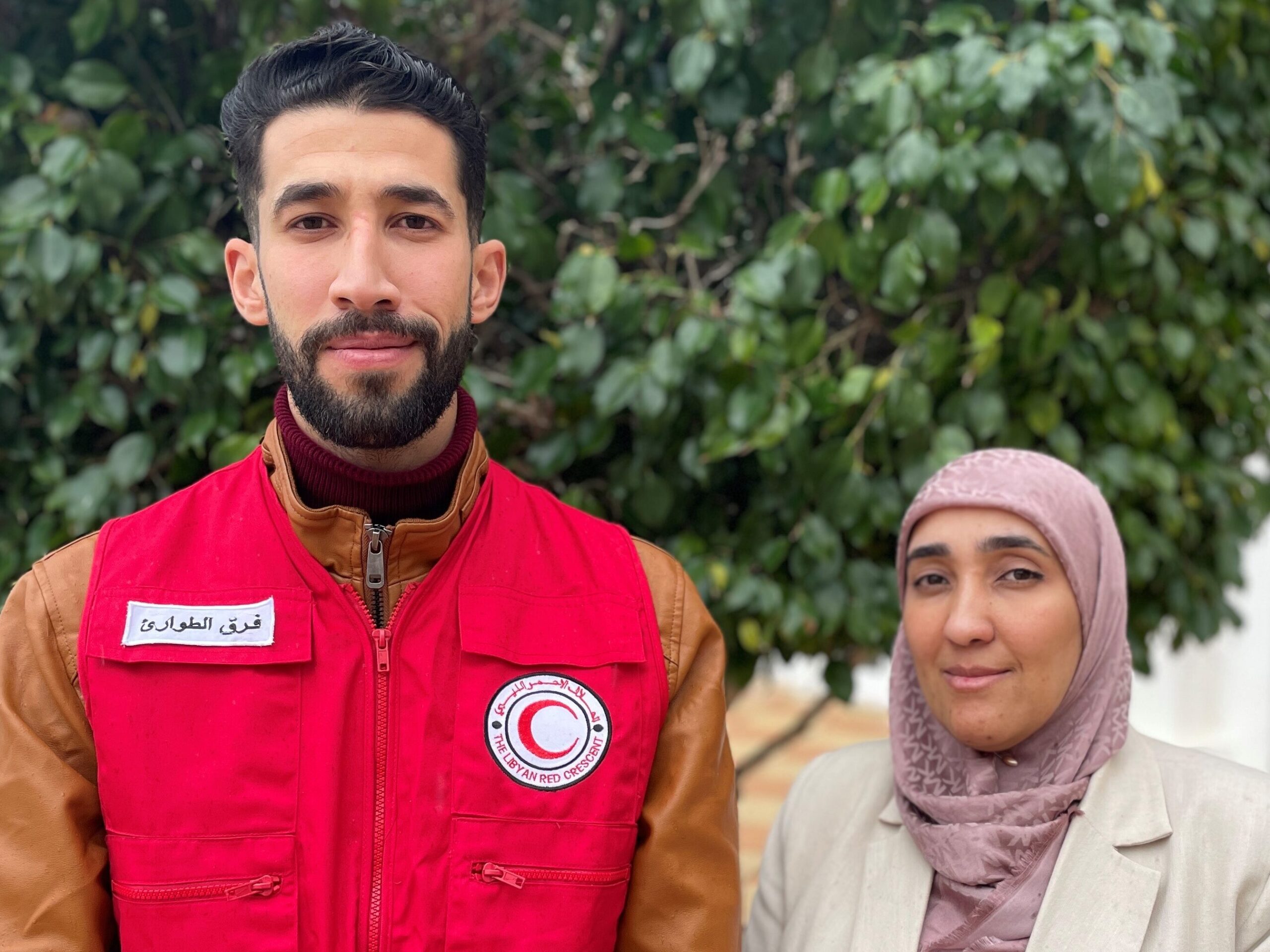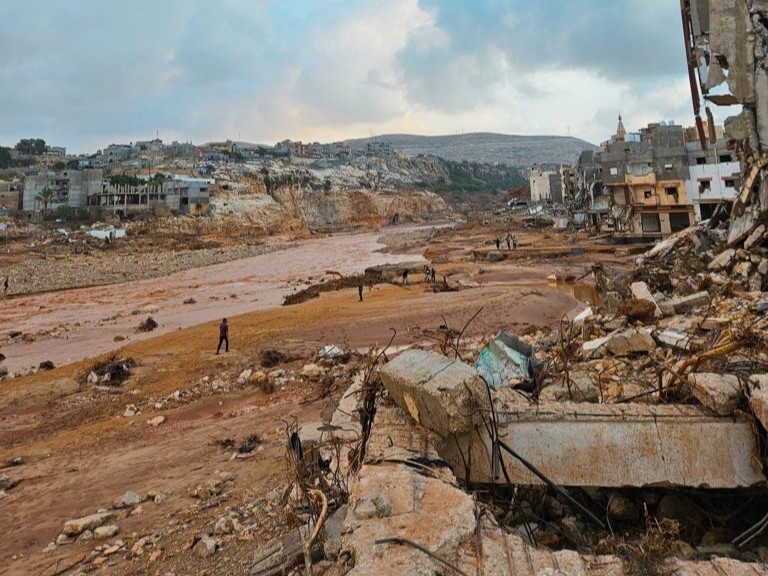Storm Daniel hit Libya on September 10th, 2023. The resulting floods were so heavy that dams collapsed, causing devastating mud streams which killed thousands of people, especially in the city of Derna. The Dutch Relief Alliance immediately launched a six-month joint response in which DanChurch Aid (DCA) and the Libyan Red Crescent (LRC) collaborated to distribute items to affected people.
As this six-month project concluded, Susanne Heukensfeldt Jansen, Humanitarian Programme Manager for Cordaid, spoke with LRC volunteers Sanad Ramadan and Amna Amhedi, as well as Ghalia Elhoani, DCA Humanitarian Coordinator in Benghazi. In this interview, Sanad, Amna and Ghalia describe the impact of the joint response and share their experiences coordinating it.

How did you prepare for the storm, and why was it so destructive?
Ghalia: ‘The government called for precautions on TV, radio and Facebook as the storm advanced, and people who lived close to the sea were asked to evacuate to schools. However, the disaster struck unexpectedly because the storm changed course at the last minute and hit Derna, further east than was initially forecast.’
Sanad: ‘We tried to ensure our own LRC members were safe, but nothing could have prepared us for the mud that cascaded from the mountain after the dams collapsed.’
Why did DCA team up with the Libyan Red Crescent (LRC) in the Dutch Relief Alliance’s Joint Response to distribute non-food kits?
Ghalia: ‘The LRC is a major humanitarian organisation in Libya. They are well respected and accepted by the communities they work in throughout the country, but also by the army. Working with the LRC as a partner therefore meant that the DCA could react more rapidly to support communities affected by the storm.’
Sanad: ‘After the storm, the army actually put us, the LRC, above themselves in rank; they cleared roads for us and gave us unhindered access to the affected areas.’
‘The LRC is a major humanitarian organisation in Libya. They are well respected and accepted by the communities they work in.’
How has humanitarian assistance in Libya progressed and how did you manage to succeed despite the many challenges you encountered?
Ghalia: ‘In the first few days, we didn’t have a clear picture of what was needed, and where, because there was no information or phone signal, and we couldn’t reach the LRC teams in Derna. The main road was destroyed, so it was a challenge to coordinate aid efforts.’
Amna: ‘And later, in the first three months after the storm, the situation was still very chaotic. People sheltered in schools where they also received support from aid organisations, but they wanted to go home as soon as possible.’
Sanad: ‘DCA knew that we, the LRC, had the trust of the people. We were able to do our best to work amid the complex situation. Now, five months after the disaster, many humanitarian actors have left but people still need assistance. That’s why we are so happy Cordaid and DCA are still providing the non-food kits now.’

Image: Cordaid
What is the situation like in Derna right now?
Sanad: ‘The destruction and damage to the city are evident. I estimate it will take at least another five years to repair and rebuild everything. Also, LRC’s office in Derna is still unusable.’
Ghalia: ‘But there are also less visible, mental wounds. People are still in shock and some succumb to severe grief. Kids are playing but troubled and whilst women express and vocalise their grief more, for men, it’s culturally harder to show emotions publicly. Our partners’ teams are focusing on providing psychosocial support, especially given the emotional toll taken on those who have lost entire families.’
‘I estimate it will take at least another five years to repair and rebuild everything.’
Can you tell us more about the non-food kits?
Ghalia: ‘We’ve distributed around 1,000 non-food kits containing essentials for families affected by Storm Daniel. One thousand more will be distributed in the coming weeks. The kits consist of lamps, soap, shampoo, multi-purpose sponges, nail clippers, garbage bags, disinfectant and diapers for families with babies.’
Sanad: ‘Disinfectant was distributed to prevent infections and rashes. Because of the mud, dirt and debris left by the storm, the sewage systems are blocked which poses a significant risk to community health.’
Amna: ‘We got a very good response from the community. We were able to provide what they asked for through a process of gathering feedback from the families to measure the effectiveness of the aid. In their opinion, the quality of the NFIs was good.’
How did you select the people who needed support?
Sanad: ‘LRC maintains a list of over 5,000 vulnerable households in Derna, and during the response, we prioritised female-headed households, households with people with disabilities and households with the elderly. We also registered households whose livelihoods were lost and whose properties were destroyed. It was challenging to prioritise between these household types because the needs were so widespread. Due to cultural norms, we ultimately decided to support women, children and the elderly first.’
How did you find the courage and strength to help others while you were affected too?
Amna: ‘I lost my best friend, my aunt and her kids; my mother was also very sick. Despite this, I see that people need me and I also find relief in helping others, but it’s hard. I try to forget. I deleted the WhatsApp conversation with my best friend (who died). But every time I close my eyes, I see my friend. And when I go to sleep, I feel like I am under water, I’m not stable, and I still hear the cries for help from the people that were swept away by the mud into the open sea.’
Sanad: ‘Many people lost loved ones. A colleague couldn’t find his house; it was swept away by the mud stream with his family inside. Even after this loss, he started to work again. A friend also continued working for LRC right after he had buried his mother. I shouldn’t complain, my mother survived. That pushed me to help other people. If I didn’t, I would feel like I had betrayed my community and friends. There are so many losses, but we don’t talk about it a lot because it makes us all sad. On the one hand, taking time to grieve is hard; on the other, it is so hard to move on.’
‘And when I go to sleep, I feel like I am under water, I’m not stable, and I still hear the crying from people that were swept away by the mud into the open sea.’
In light of increasing climate-related disasters and the rise of a new phenomenon called ‘medicanes’ (a ‘Mediterranean hurricane’), what measures do you believe should be taken to better prepare vulnerable cities and communities?
Sanad: ‘We need to plant more trees for water regulation, carbon sequestration and soil stability. It enhances resilience to climate change.’
Ghalia: ‘More awareness of climate and environmental issues is also needed in Libya. One effective measure could be promoting the use of garbage bags to prevent blocked sewage caused by waste accumulation. Advocating for proper waste management practices and increasing public awareness about the importance of recycling could significantly mitigate the impact of extreme rainfall on urban infrastructure.’
What do you foresee for the affected communities after the Joint Response ends?
Ghalia: ‘People are trying very hard to rebuild their lives. We are trying to overcome adversity by fostering a sense of solidarity within the community, which will lay the groundwork for long-term recovery. Now that people have improved access to basic needs, livelihood opportunities need to be created to help communities recover. Moreover, if the capacity of local organisations (such as the LRC) can be strengthened, they can better help their communities from within. We also need more psychosocial support for parents with young children.’
‘We try to make every day count. Every day is a new beginning.’
Libya rarely makes it to the headlines in Western media and people don’t know much about the country, culture and people. What do you want people to know about Libya?
Ghalia: ‘We are survivors. We have faced a revolution, wars, conflict, economic instability, and now devastating flooding. In the face of all this, we try to make every day count. Every day is a new beginning.’
DCA coordinated inside Libya and Cordaid facilitated from the Dutch DRA perspective. This interview was held on 1st March 2024.
Header image: Devastation after the flooding in Libya in September 2023. Image: Mchs.gov.ru
